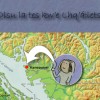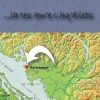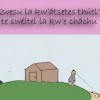Ileqet means ‘to buy’‘. This word comes from iláq – ‘stern of a canoe,’, ‘stern man’, because traditionally it was common to travel and trade items carried in a canoe.


Ileqet means ‘to buy’‘. This word comes from iláq – ‘stern of a canoe,’, ‘stern man’, because traditionally it was common to travel and trade items carried in a canoe.

Kw’ulh la hálém the kyó means ‘The train was already gone‘ or ‘The car was already gone’.

La hálém te kyó means ‘The car (is) going’. Here Elizabeth is referring to a railroad car, so a fluent translation would be ‘The train is going’.

Hálém means ‘going’ or ‘to be going’.

Olsu la tes kw’e Lhq’á:lets means ‘So I reached Vancouver’, or ‘So I got to Vancouver’.

…la tes kw’e Lhq’á:lets means ‘to reach Vancouver‘, or ‘…to get to Vancouver’.

Tés means ‘to reach, to get to’. You can also use it for ‘to get close to, to approach’.

Xweí’ q’ólthet means ‘to return’‘ or ‘to come back’. It is roughly the same as me q’ólthet, but uses a different auxiliary (‘helper’) verb.

Lhq’á:lets is the Halq’eméylem name for ‘Vancouver‘. Literally it means ‘widening at the bottom‘, referring to the Fraser river delta.

Qwesu la kw’átsetes thútl’o te swétel la kw’e cháchu means ‘She went and looked at the nets at the beach’.
